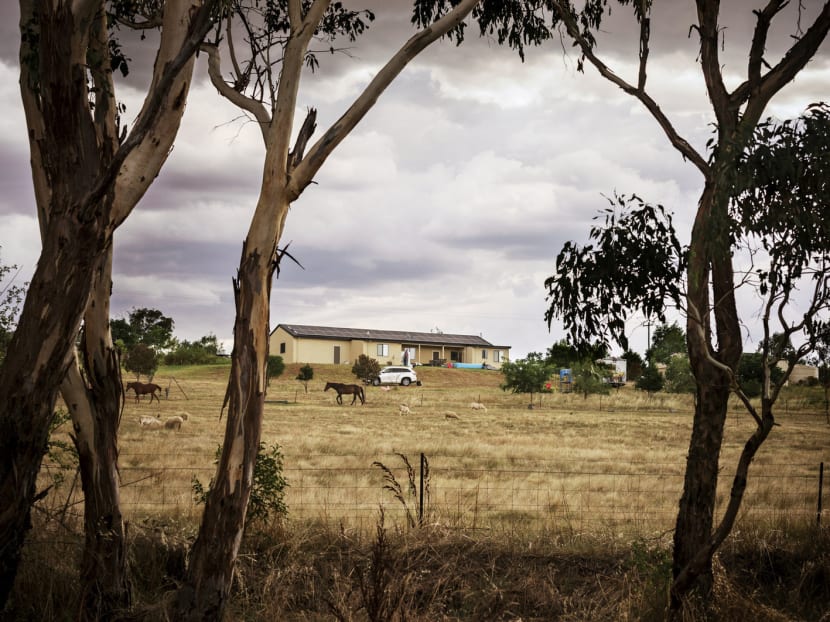Arrest of IS suspect in rural town puts Australia on edge
YOUNG (New South Wales) — On a rural road about two hours’ drive from the nearest major city, the small Australian town of Young has long been known for cherries and little else. But in recent years, the once largely white, working-class community has seen a steady influx of Lebanese Muslim families, many of whom say they have relocated from Sydney for a better and safer life.

Police search the property of Haisem Zahab on the outskirts of Young, Australia, on March 2. Zahab is accused of using the Internet to try to help Islamic State develop a guided missile. The accusation that a Muslim and his family helped the militant group echoed Australians’ worst fears over immigration and homegrown links to terrorism. Photo: The New York Times
YOUNG (New South Wales) — On a rural road about two hours’ drive from the nearest major city, the small Australian town of Young has long been known for cherries and little else. But in recent years, the once largely white, working-class community has seen a steady influx of Lebanese Muslim families, many of whom say they have relocated from Sydney for a better and safer life.
Among them are members of the Zahab family. Now, one of them, Haisem Zahab, a 42-year-old electrician, is accused of using the Internet to try to help Islamic State (IS) develop a guided missile. Officials suspect that some of his relatives travelled to Syria to join the extremist group.
The allegations about the Zahab family have rattled many residents of this town, who have long taken pride in its peaceful multiculturalism. They have also stoked some of the worst fears about homegrown links to terrorism, in a country that is grappling with immigration policy and labour shortages.
“One argument developing is that Muslims cannot be trusted, they are all bad and, with so many in our town, it was only a matter of time before trouble raised its head,” wrote Mr Craig Thomson, editor of The Young Witness, the local newspaper, in an opinion column after Zahab’s arrest. “The other point put forward is that hatred is not the way to handle this situation and one man’s actions should not condemn the entire town’s Muslim population.”
The case is playing out as Australia contends with the same nationalist, anti-immigrant forces that helped propel Mr Donald Trump to the American presidency and that prompted voters in Britain to approve a withdrawal from the European Union.
Zahab was arrested, with his family present, during a raid at his property in Young on Feb 28. He was accused of researching and designing a long-range guided missile and laser warning device for use by IS militants.
Zahab’s extended family had been under investigation for 18 months, and officials suspected that some of his relatives had travelled to Syria to join IS and had sent money from the sale of their Sydney home to terrorists in Syria. A police report detailed how investigators believed the family had moved money to IS.
“Family members had access to a significant amount of funds in an Australian bank account and were suspected of using international travel cards and a computer consulting company based in the Middle East to remit funds out of Australia for the use and benefit of Islamic State in Syria,” said the report, adding that members of the family were believed to have already travelled to Syria to become members of the terrorist group.
Zahab was charged with foreign incursion offences, which are anti-terrorism statutes that carry a maximum penalty of life in prison.
Zahab is no stranger to law enforcement, having pleaded guilty previously to drugs and firearms charges. He is linked to a business called Oz Survival Gear, which is registered to the address that was raided by the police. The company sells items such as Swiss Army knives and flashlights, and it proclaims that “a knifeless man is a lifeless man”.
Zahab was known as something of an outsider who rarely interacted with the local Lebanese Muslim community. But his arrest has sent some Muslim residents of Young into hiding, said people in the community.
Young’s council administrator Wendy Tuckerman said that Zahab’s arrest should not taint the rest of the community, which has “a rich multicultural history”.
“It is important that we acknowledge that the scope of the arrest is limited to the actions of one individual,” said Ms Tuckerman.
Mr David McCabe, a local lawyer who has represented Muslim slaughterhouse workers in the area, said some of the families who relocated to Young did not want their children to grow up with the gang mentality fostered in parts of Sydney.
But Dr Clarke Jones, an expert at Australian National University on terrorism and radicalisation, said that Young’s remoteness may have made it an attractive spot for hiding efforts to support foreign terrorist groups. “Young was probably chosen as a destination because it’s out of the radar of the usual police attention of Melbourne and Sydney,” said Dr Jones.
Dr Jamal Rifi, a Muslim community leader in Sydney, called it unfortunate that the actions of one man could taint Australia’s Muslims.
“That is symptomatic of exactly what has been happening in the past couple of years — when the actions of a small number like this Young man (discredit) the Australian Muslim community at large,” he said. “It is a phenomena that has been happening across Australia.”
Zahab’s arrest comes as Australians have been on heightened alert. The terrorism threat level in the country was elevated to “probable” in September 2014, and since then there have been four attacks tied to terrorism in Australia. Prime Minister Malcolm Turnbull said that a dozen more have been foiled and that more than 60 people have been charged as a result of counter-terrorism operations across the country. THE NEW YORK TIMES






